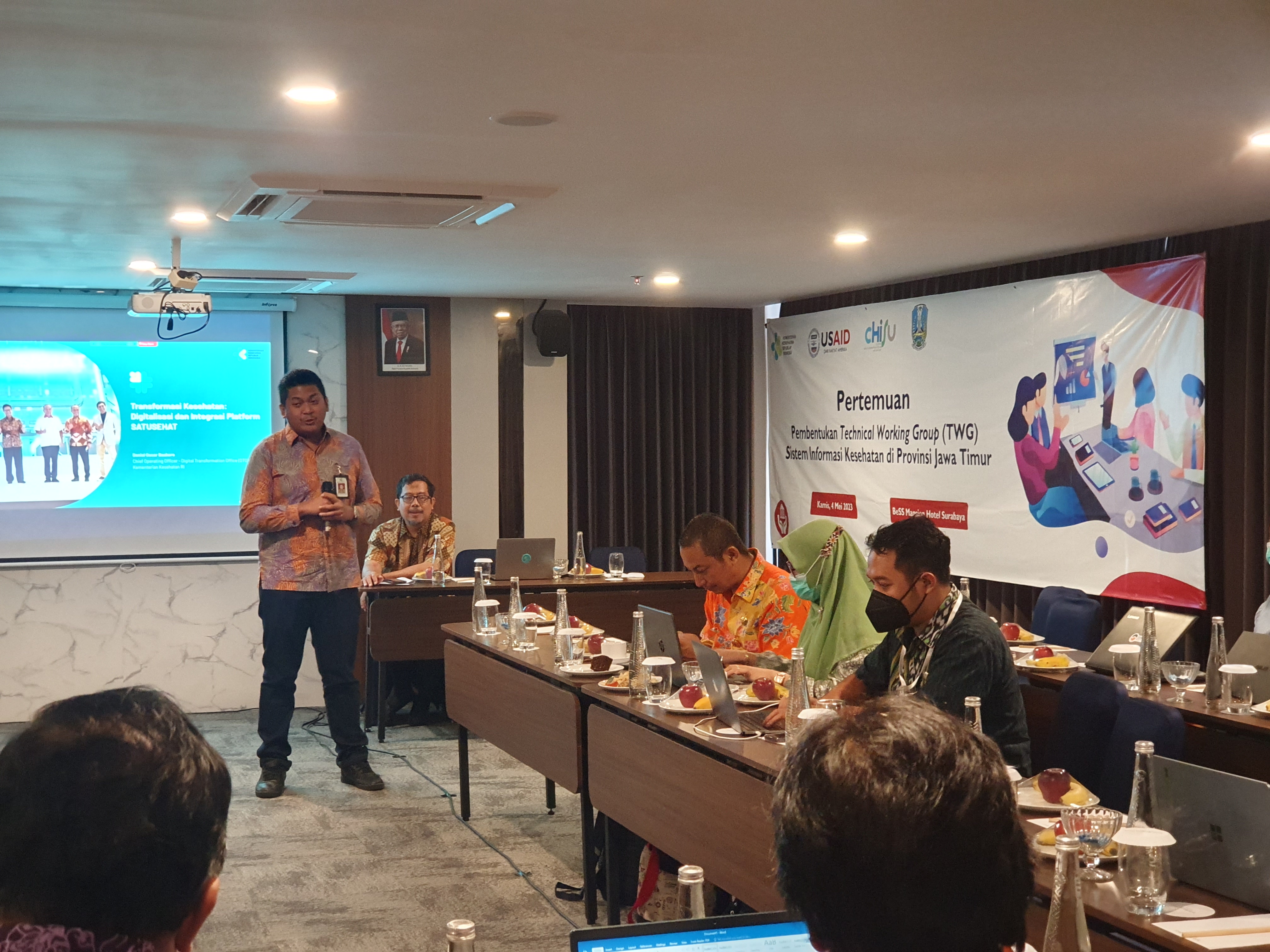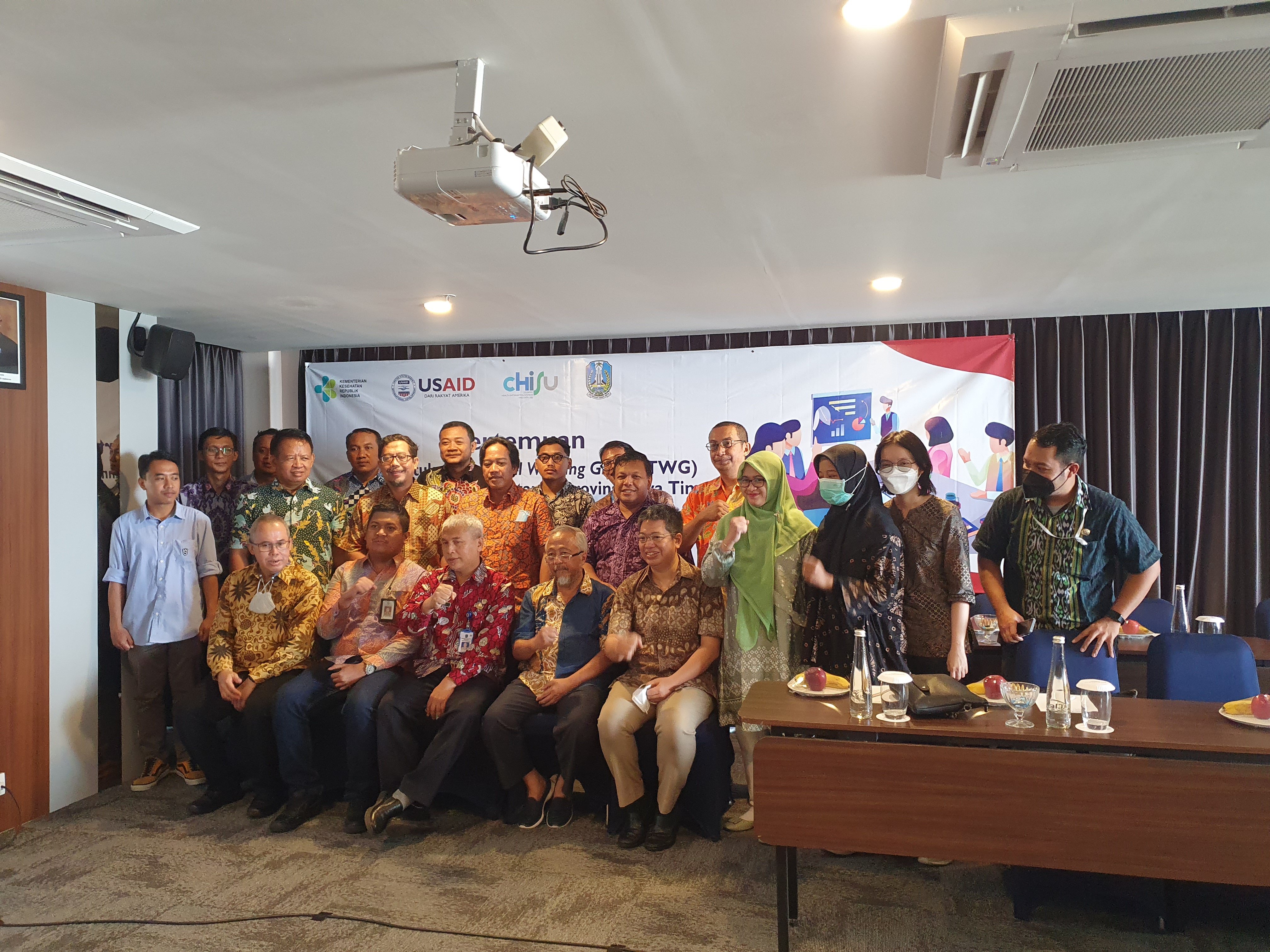May marked a big development for health information system (HIS) strengthening in Indonesia’s East Java province. A multi-stakeholder technical working group (TWG) has been established to accelerate the development of HIS in the country—and with CHISU support, the East Java HIS TWG aims to model national-level multi-stakeholder collaboration efforts to improve the efficiency of health data use. The new TWG will do this by strengthening the implementation of SATUSEHAT at the subnational level, which is Indonesia’s health information exchange platform and central to the digital health transformation of Indonesia.


The establishment of East Java’s HIS TWG builds on previous CHISU-supported work at the national level. CHISU helped Indonesia’s Ministry of Health (MOH) establish a national-level multi-stakeholder HIS TWG with approximately 35 representatives from across the ecosystem of HIS stakeholders, including professional associations, the private sector, communities of practice, implementing partners, development partners, and academia. The national-level HIS TWG will support communication and feedback, as well as documenting successes and lessons learned from SATUSEHAT rollout, developing policy recommendations, advising on technical areas, and supporting coordination of resources. In addition to the leadership team and the main body of the HIS TWG, there are three working groups focusing on projects related to data standardization, onboarding of users to SATUSEHAT, and data use practices.
HIS TWGs at the national and subnational levels are an essential component of CHISU’s activities in Indonesia related to the program’s first strategic objective: strengthening governance and HIS enabling environment. The subnational TWGs will serve as a multi-stakeholder platform for knowledge sharing, communication, and coordination of HIS strengthening activities in the three provinces in Indonesia where CHISU works, including East Java.
“With CHISU support—and in line with the Blueprint for the 2021-2024 Health Digital Transformation Strategy issued by the Indonesian Ministry of Health—the East Java Provincial Health Office will actively participate in strengthening the digital transformation of the health information system to have a positive impact on the achievement of maternal and newborn health, tuberculosis, and health financing programs,” said Mohamad Yoto, Acting Secretary of East Java Provincial Health Office, during the subnational HIS TWG meeting on May 4.
This initial HIS TWG meeting provided a space for stakeholders to analyze the current status of the East Java HIS, identify priority issues for the TWG to tackle, and develop the member structure as well as roles and responsibilities.
In the meeting, the chairman of the national-level HIS TWG Ahmad Hidayat also highlighted that strengthening HIS calls for multi-stakeholder involvement and support. “The TWG provides a bottom-up approach that involves important inputs from relevant stakeholders in HIS implementation to ensure its continuity,” he said.
Stakeholders from the East Java Provincial Health Office, district health offices, universities, Association of Indonesian Medical Record and Health Information Professionals, and private sector stakeholders make up the East Java HIS TWG, which has approximately 35 members and will meet monthly. This diverse array of stakeholders, representing the entire health information system ecosystem, will serve as a cross-sectoral forum to support HIS in East Java, regularly monitor and evaluate HIS performance, support roll out of SATUSEHAT, provide policy recommendations, and overall coordinate and communicate on HIS in East Java to optimize technical expertise and resources.
The subnational HIS TWG in East Java is also endorsed by Indonesia’s Ministry of Health through its Digital Transformation Office (DTO) Kemkes and CHISU will support the DTO to work with the Provinces of South Sulawesi and DKI Jakarta to establish similar coordination bodies that are adapted to the provincial context.
“Local stakeholders have a key role in the implementation of health technology transformation, which they embody through supporting and overseeing digitalization programs for health care service providers, providing infrastructure and tools, and allocating human resources and strengthening stakeholders’ collaboration,” said DTO’s Chief Operating Officer Daniel Oscar Baskoro.